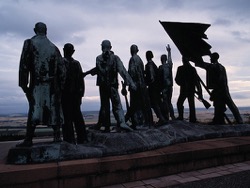
Terrorists again blew up Europe. And now that the first shock has passed, time to think about why this is happening. However, for many Russians it is not a question: of course, because they spread democracy with multiculturalism, and totally – well absolutely! – don’t care about security.
Such a response strongly suggests TV. We have something wrong. We have the security of the real. And if this simple idea is not carried out with the full sequence, just because even propagandists understand that Russia from terrorism are not immune. But they always find a way to hold your thought in a roundabout way, without losing credibility, because they are professionals.
In fact, terrorism is not a consequence of democracy and its deficits, and the political games that lead authoritarian regimes. More democracy – less terror. Conversely, the dictatorship, even if its leaders are concerned about the security so that the fly will not fly, is a perfect breeding ground for political violence, at home and abroad.
Political violence is, of course, is not news. Founder of great, friendly people’s Republic of China Mao Zedong used to say that the rifle gives birth to power. And before the struggle of the Communist party of China with the Kuomintang acquired the character of regular war, the methods of Mao, if you look at them from a modern point of view, were quite the terrorist. Anyway in Russia “Primorye partisans”, in which Russia tried to act the same, have been convicted for terrorism. And in General deserved.
Right now two of the five BRICS countries – Brazil and South Africa – are in power the leaders in the earlier stages of his career, took an active part in the actions that any modern court would have qualified as terrorism. But in fact, the rulers of a dozen countries – from Nicaragua to East Timor paved his way to power with a Kalashnikov assault rifle and bomb. So was the arranged policy of the seventies.
Academy of terror
I think not reveal a big secret if I thought the main international sponsor of terrorism in the heroic (hopefully, last) time was the Soviet Union. In the words of Soviet propaganda has always condemned individual terror. But the idea that distinguishes it from the revolutionary struggle, was quite blurred. For example, if the combat organization of the African national Congress of South Africa, which operated under the characteristic title “Spear of the nation”, killing an official, it was a revolutionary struggle. To practice in the bombing, young activists of the ANC had the opportunity to avoid prison by going to study in the University named after Patrice Lumumba. About bond bond multiple kisses of friendship between General Secretary Brezhnev and widely recognized terrorist Yasser Arafat and say no.
More disguised, but no less active was Soviet support for terrorist organizations operating in Western Europe. Then it is carefully concealed, but now it is well known that support from the USSR and Eastern bloc countries (particularly the GDR) received the most active terrorist groups of that period, including the Irish Republican army which operated in West Germany the red army Faction.
Bygones, you say? Not so. It is actively supported by the Soviet with money and arms layer of different kinds of revolutionaries served as the Academy in which were developed the organizational foundations of modern terrorism. From this layer came out and the Islamic militants of the new generation. In Russia it is widely known that the insurgency in Afghanistan, played a decisive role in shaping al-Qaida, was supported by the United States. Less widely known that trained staff for this movement were provided by Palestinian and Iranian terrorist organizations, which for many years contained the Soviet Union. Terrorism was one of the fronts of the cold war, and both sides are responsible for the overall outcome. But the responsibility of the USSR, perhaps more.
The boomerang effect
Few people is aware that, in broad retrospect, the peak of terrorism falls on the seventies of the last century, and what we are witnessing now is in many respects a replica of that period. However, the differences are obvious. The main one is that if the terrorists of the seventies fought for political power, which wanted to use for social reconstruction (hence of mutual sympathy between them and the Soviet Union), the aim of modern Islamic terrorism was the change in the global political order. Not that they don’t need power, but power in the scale of the old national state is not enough for them. They need a new, global super-state.
This turn was a consequence of the collapse of the very idea of the nation state, and especially in the Arab world. Let me remind you that the Arab world is the only world region where almost never, for a paltry and short-lived exceptions, there was no democracy. There are political regimes in two types – absolute monarchies (as in Saudi Arabia and the Gulf principalities) and electoral authoritarian regimes (as in Egypt and Algeria). Authoritarianism leads to the fact that, first, it significantly restricts the power struggle within the ruling class. Secondly, hinders the socio-political elevators, not allowing the lower classes to hope for a successful political career.
And the designer is ready for a terrorist organization: so Osama bin Laden, with money, but without political opportunities, finds Muhammad unemployed, without money and without hope for a better life, but with a burning hatred of the existing order. Before Muhammad became a nationalist and a socialist. Perhaps he would join the terrorist organization of the relevant kind, spreading terror among local officials and businessmen. However, to blow up Brussels he wouldn’t come. But Arab socialism gone along with the Soviet Union. And nationalism is completely compromised, corrupt, predatory dictatorships like the one the existence of which we are so painfully trying to extend to Syria.
When the middle East began the so-called “Arab spring”, we had no shortage of arguments about that all – American intrigue and anything-that they will not work, because against legitimate authority. And really, did not work. In Syria, say, the legitimate government has resisted. Russia actively contributed to this, and I believe (although who knows for sure?), what if Assad lost power a few years ago, now in Brussels, it would be all quiet. But more importantly, the “Arab spring” was the last hope that the discontent of the Arab masses will be able to send at least some potentially constructive direction. After its collapse explosions in Paris and Brussels became inevitable.
To the extent that modern Russia is trying to do something in the international arena, it largely operates according to the Soviet patterns. We assist the armed opposition in the neighboring country, supported by the moss-grown tyranny in the country away. Such, as they say, attracts like. But if the Soviet experience is so instructive, we need to understand the long-term consequences of such a policy








